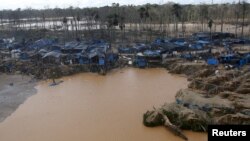Peruvian police razed dozens of illegal gold mining camps at the edge of an Amazonian nature reserve this week, part of a renewed bid to halt the spread of wildcatting in a remote rainforest region.
The stings at the edge of the Tambopata National Reserve were the first in the southeastern region of Madre de Dios since a crackdown let up in December.
Another six operations planned for the rest of the year - about the same pace as in 2014 - could sap a fledgling rebound in gold output from Peru, the world's fifth biggest producer and exporter.
Production from wildcat miners in Madre de Dios, who sell their ore up the supply chain, made up about 10 percent of national production before President Ollanta Humala launched the harshest crackdown yet on illegal gold mining last year.
In a two-day operation that ended late Tuesday, police burned down more than 50 mining camps, detained six people on suspicions of human trafficking, and blew up dozens of motors that power makeshift dredges in alluvial mining pits.
Most miners had fled before authorities arrived.
Police also struggled to find valuable machinery that miners had hauled away or sunk into gaping pools of murky water bordering their camps.
Critics say the police stings are stop-gap measures that do little to curb the decade-long gold rush in Madre de Dios driven by high gold prices. Officials say wildcatters have already cleared more than 50,000 hectares (124,000 acres) of rainforest in Madre de Dios.
"We have to come here constantly until these criminals understand this is a crime," said illegal-mining czar Antonio Fernandez.
Police also destroyed the businesses - from nightclubs to grocery stores - that support miners in the jungle in ramshackle structures made from logs and blue tarp.
Some people who fled the camps watched on from the edge of the forest.
"We're human beings, not animals," said Carmen as she carried a toddler and bundle of belongings.
She declined to give her last name and said she worked as a camp cook. "What are we going to do now?"
Last year's crackdown halved output from unregulated mines in Madre de Dios to 8 tons. Output rose 28 percent in the first five months of 2015 from a year ago.
The campaign had stopped because police were needed to control protests against a copper project, said Fernandez.





